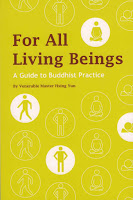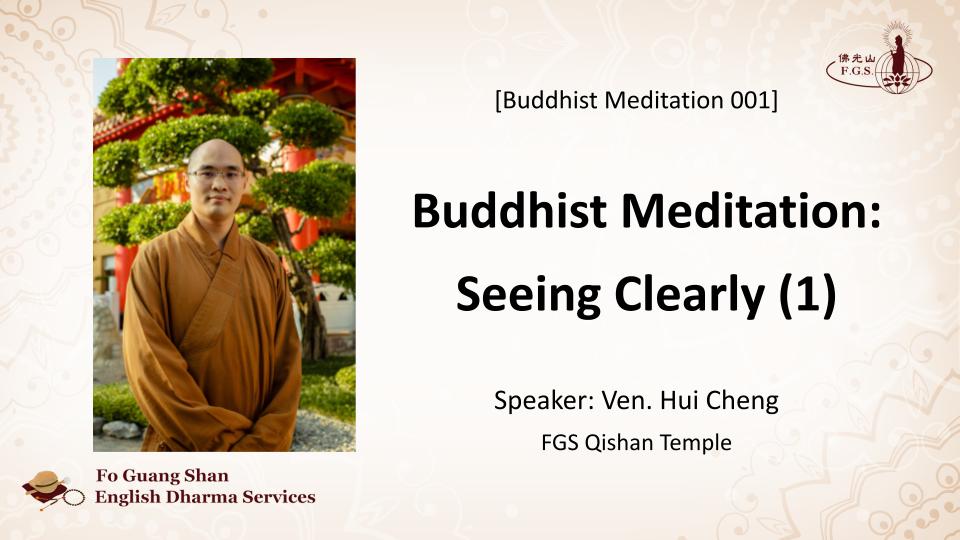
Speaker: Venerable Hui Cheng
Fo Guang Shan Qishan Temple
Auspicious greetings to our friends around the world. This is Hui Cheng from Fo Guang Shan Monastery in Taiwan. I hope that this online session of Fo Guang Shan English Dharma Services finds you well.
I. Introduction
Today’s sharing will be an introductory session to a 5-part mini-series on Buddhist Meditation. This series will provide a detailed and comprehensive guide to the holistic practice of meditation within the Threefold Training framework of morality, meditation, wisdom, in the hopes of providing practical advice on how meditation should be practiced in everyday life, as well as how to deepen the practice for spiritual growth.
II. Meditation in Modern Society

In recent years, the benefits of meditation have been widely documented in the West, and many people have experienced first-hand the life-changing benefits of this ancient practice. Meditation is now analogous to improved physical, mental, and emotional well-being, and is known for its potential for unlocking of creativity and transforming one’s character. However, it is not easy to understand the full extent of what Buddhist meditation can do for us without first understanding Buddha’s intention for the use of it. It is also imperative that one understands the requisite conditions of successful meditation.
Whenever we speak of meditation, what usually springs to mind is the image of a person sitting cross-legged on a cushion, eyes-closed and hands in the concentration mudra, looking very “Zen”. In the West, the terms “mindfulness” and “contemplative practices” are often used in lieu of the term “meditation”, placing a focus on the development of an awareness of body and mind. In the field of psychology, certain methods of therapy rely on contemplative practices to allow one to “re-train” one’s mind to function healthily.

While all of the above are helpful in relieving stress and promoting peace of mind in the here and now, it is often the case that the fundamental purpose of meditation is often overlooked, and the development of requisite conditions bypassed for a speedy crash course on how to live peacefully. It is hoped that through this mini-series on meditation, these important points may be acknowledged. Once we understand the purpose and requisite conditions for meditation, we will find that meditation is not only a practice done sitting on a meditation cushion, but a state of mind and attitude of life one maintains in all aspects of life, in both stillness and movement. It is a path to true joy and wisdom, and an indispensable part of living a good life.
III. The Threefold Training-a Holistic Approach to Meditation
Buddhist meditation was developed based on the Buddha’s insight into the human condition and has the goal of leading one to Enlightenment. In other words, it has the goal of acknowledging and eliminating mental afflictions and ignorance, so that one may see the world clearly and as it is, through the eyes of prajñā, that is, direct insight into the truth. It allows one to live in this world but not bothered by it, and intricately engaged with its affairs but not be caught up in them. However, successful meditation is dependent on certain prerequisites.

According to the Buddha, there are three aspects of successful Buddhist practice, namely Morality, Meditation, Wisdom, the Threefold Training. These three categories of training are not individual components of practice, rather they are interconnected and interdependent aspects of holistic Buddhist practice. Thus, meditation needs to be based on morality and guided by wisdom for it to be truly effective.

The practice of morality is based on proscriptive and prescriptive guidelines. The proscriptive guidelines entail abandoning negative actions of body, speech and mind that bring harm to oneself and others, such as killing, stealing, lying, sexual misconduct, intoxicating oneself, or actions inspired by anger or greed. The prescriptive guidelines entail cultivating virtuous actions of body, speech and mind, such as generosity, patience, gentle speech based on compassion and loving-kindness, etc., all of which leads one towards developing wholesome mental states conducive of meditation.


There are two main aspects of meditation, śamatha and vipaśyanā, or in other words calming and insight. Śamatha works to develop a deep, static state of one-pointed concentration on a subject of focus, and leads to samādhi, a state of mental tranquility that is unperturbed by either internal or external disturbances. After one achieves one-pointed concentration, one turns to develop wisdom through vipaśyanā, or insight into the reality of phenomena by developing the Four Bases of Mindfulness, whereby the type of concentration that accompanies this practice is a fluid, moment-to-moment mindfulness or attentiveness that observes the incessantly changing states of mind and phenomena. This will be discussed in detail during subsequent sessions.

Although each component of the Threefold Training is ideally practiced in unison a beginner to Buddhist practice would find it rather difficult to balance all three equally. Essentially, Morality, Meditation, and Wisdom address three corresponding levels of the mind, that is, physical and verbal acts, active mental actions or manifestations, and latent or subconscious tendencies. In most cases, it is recommended that one begins working on morality as an entry point into the Threefold Trainings, since our actions and speech are easily identified and addressed.
In short, this mini-series of five sessions will elaborate on:

Session 1: The Prerequisite of Morality
Session 2: The Prerequisite of Right Views and Right Intentions
Session 3: The Functions and Techniques of Śamatha or Calming Meditation
Session 4: Requisite Understandings for Practicing Vipaśyanā or Insight Meditation
Session 5 The Four Bases of Mindfulness

The focus for today’s sharing is on the preliminaries of meditation, starting with morality in relation to external actions.

IV. Training of Morality-addressing the coarse manifestations of the mind
Living Life Attuned to Our Inherent Goodness
According to the Buddha, compassion is the basis of Śīla, or morality.

Morality here does not refer to obedience, a sense of obligation, or external constraint; it refers to an ethical compass within self and relationships that guides us to maintain harmony both in our interactions with others and within our own conscience. It is the practice of non-harm, and non-violation of self and others. It can also refer to “intentional behavioral discipline”, “virtue”, or “ethics” according to one’s commitment to the Buddhist path of awakening.

Śīla has three degrees of manifestation. The highest degree is inner virtue, the innate goodness of all beings. The second degree refers to virtuous actions of body and speech inspired by inner virtue, while the third refers to guidelines for conduct governing actions of body and speech which are designed to bring them into accord with the ethical ideals. The most common guideline is the Five Precepts, which are not killing, not stealing, not lying, not taking intoxicants, and not engaging in sexual misconduct. It is important to make the distinction here between externally enforced rules and the willful following of ethical guidelines. No one can ever force us to abide by the precepts per say, as the observance of precepts is a personal vow and aspiration to better oneself.

V. Why is the development of morality a prerequisite for meditative practice?
From a Buddhist perspective, all beings have a Buddha nature, the inherent potential to perfect the human condition and become a Buddha. This Buddha nature is analogous to inner virtue, or innate goodness. It is also the source of our potentiality to do good. Going against our inner virtue by engaging in unwholesome deeds creates disharmony in our minds, as we are going against our clear conscience.
Śīla functions as the foundation for meditation in two ways. First, the observing Śīla promotes a clear conscience, essential to the development of concentration. It prevents us from being harassed by restlessness and feelings of guilt.
Secondly, observing the precepts and engaging in virtuous actions of body and speech unifies the mind and prevents us from being caught in a crossfire of incompatible motives disruptive of the meditative frame of mind. As we meditate, we are intending to settle the defilements of greed, anger, and ignorance so that the mind can achieve a certain degree of peace. If we allow ourselves to act in violation of the precepts, defilements will be triggered, and meditation will be hindered.

Right livelihood
Right livelihood is also part of morality. When we speak of livelihood, we refer to what we do for a living. Engaging in occupations that are in accordance with morality helps one maintain a clear conscience. This is helpful for maintaining peace of mind. More importantly, right livelihood also refers to our lifestyle, or how we organize our lives.

Venerable Master reminds that part of right livelihood is having well-disciplined habits such as getting an adequate amount of sleep, food, and exercise. Right livelihood not only promotes efficiency and health, it also enables us to have a joyous family life and a stable society.
The right amount of sleep varies between individuals. Some require 6 hours, some 7 or 8. Modern research suggests that a good amount of sleep is between 7-9 hours for most, with children and adolescents requiring more and those over age 64 requiring less. With regular meditation, one may start to feel that less sleep is needed. Too much sleep blocks the body’s energy channels while lack of sleep leads to tiredness and drowsiness. Sleeping early and rising early is best.
The correct amount of food, and the right foods affect the quality of meditation. Avoid overly oily, salty, sweet, sour, or spicy foods that overly stimulate our senses. Over consumption of processed foods and meat have a negative impact on our metabolism. It takes much longer for our digestive system to process such foods and may cause our bodies to feel lethargic. Instead, opt for a fiber-rich vegetarian diet of fresh fruits, whole grain cereals, legumes, soy products, and vegetables to maintain lightness of body and mind. Allow at least 1-2 hours after meals before sitting meditation sessions, so that your body has enough time to digest.

Moderate exercise is vital to keeping the body in shape. Yoga postures are beneficial in keeping the muscles and joints flexible, while regulating the energy channels within the body. Gentle physical exertion and cardio workout through sports or simply walking helps maintain healthy circulation and promotes healthy cardiovascular function. This is crucial since breathing plays an important role in meditation.

To recap, this first session has offered a general introduction to meditation based on the Buddhist framework, and has discussed the prerequisite of morality, the main topic for session 1 of the mini-series on meditation.
Śīla functions as the foundation for meditation by promoting a clear conscience essential to the development of concentration, free from restlessness and feelings of guilt. It also prevents us from triggering and entertaining defilements disruptive of the meditative frame of mind caused by engaging in speech and actions based on greed, anger, and ignorance.
Right livelihood allows us to maintain a healthy body and mind. Session 2 explains the importance of developing the right worldviews, intentions, and goals for meditation. With the right world view, the practice of morality becomes effortless.
Thank you for joining us for session 1 of the mini-series on meditation. If you find this Dharma service beneficial to your practice, please subscribe to the FGS English Dharma Services YouTube Channel and share it with your friends. May the merits of this session bless you with the conditions conducive of right meditation and wisdom. See you next week, Omituofo.
For All Living Beings

In For All Living Beings, Venerable Master Hsing Yun shows us that the path to a life that is wholesome, peaceful, and filled with wisdom begins by helping others. With humor and a love of storytelling, For All Living Beings, teaches us how doing the right thing can make us free, how meditation can open the mind, and how wisdom can enter every part of our life and lead us to enlightenment.
Read it here

